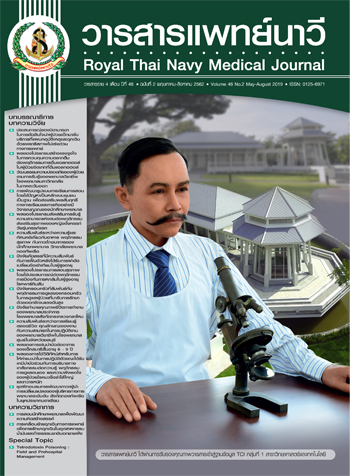The Effects of Perceived Self-Efficacy Promoting Program on Health Promoting Behavior of Primigravida Adolescents
Main Article Content
Abstract
The purpose of this quasi-experimental research was to examine the effects of using the perceived self-efficacy promoting program in self-care on health promoting behavior of primigravida adolescents. The research sample consisted of 40 patients who were equally assigned into either an experimental group or a control group by matching scores on a social support test. The experimental group received the perceived self-efficacy promoting program, whereas the control group received regular nursing care activities. The research instrument developed by the researcher was the perceived self-efficacy promoting program, composed of the perceived self-efficacy promoting lesson, flip chart and booklet. All instruments were reviewed for content validity by a panel of expert. In addition, instrument for collecting data were the social support test, self-efficacy test and health promoting behavior test which were tested for reliability at 0.94, 0.96, and 0.86, respectively. Data were analyzed by using t-test.
Major findings were as follows:
- The health promoting behavior of primigravida adolescents in the experimental group, after using the perceived self-efficacy promoting program was significantly higher than before at the p < .01 level.
- The health promoting behavior of primigravida adolescents in the experimental group, after using the perceived self-efficacy promoting program was significantly higher than those who received regular nursing care activities at the p < .01 level.
Article Details

This work is licensed under a Creative Commons Attribution-NonCommercial-NoDerivatives 4.0 International License.
References
2. Lee SH, Lee SM, Lim NG, Kim HJ, Bae SH, Ock M, et al. Differences in pregnancy outcomes, prenatal care utilization, and maternal complications between teenagers and adult women in Korea: a nationwide epidemiological study. Medicine (Baltimore) 2016 Aug;95(34):e4630.
3. Eimkhong P, Janlamphu A. Birth statistics of Thai adolescent mothers 2013. Bareau of Reproductive Health, Department of Health, Ministry of Public Health. Nonthaburi: WVO Officer of Printing Mill; 2014. (in Thai).
4. Kongsuriyanavin W, Kunrattanaporn B, Techatraisak K. Factors affecting postpartum women’s mental health. Thai Journal of Nursing Council 2010;25(1):88-99. (in Thai).
5. Chaisawan K, Serisathein Y, Yusamran C, Vongsirimas N. Factors predicting postpartum depression in adolescent mothers. J Nurs Sci 2011;29(4):61-9. (in Thai).
6. เบญจพร ปัญญายง. การทบทวนองค์ความรู้ การตั้งครรภ์ในวัยรุ่น. กลุ่มที่ปรึกษากรมสุขภาพจิต กระทรวงสาธารณสุข: สำนักงานกองทุนสนับสนุนการสร้างเสริมสุขภาพ (สสส.); 2553.
7. Narukhutrpichai P, Khrutmuang D, Chattrapiban T. The obstetrics and neonatal outcomes of teenage pregnancy in Naresuan University Hospital. J Med Assoc Thai 2016;99(4):361-7. (in Thai).
8. Nguyen PH, Sanghvi T, Tran LM, Afsana K, Mahmud Z, Aktar B, et al. The nutrition and health risks faced by pregnant adolescents: insights from a cross-sectional study in Bangladesh. PLoS One 2017;12(6):e0178878. doi: 10.1371/journal.pone.0178878. eCollection 2017.
9. Yassin SA, Sobhy SI, Ebrahim W. Factors affecting dietary practices among adolescent pregnant women in Alexandria. The Journal of the Egyptian Public Health Association 2004;79(3-4):179-96.
10. Pender NJ. Expressing health through lifestyle patterns. Nursing science Quarterly 1996:30(3);115-22.
11. Jiusitthipraphai T, Nirattharadorn M, Suwannarurk K. The effects of promoting self-efficacy program on the oral contraceptive used behavior among adolescent mothers. J Med Assoc Thai 2015;98(5):444-50. (in Thai).
12. Chumsri T. Relationships between personal factors, perceived benefits, perceived barriers, perceived self-efficacy, interpersonal influences and health promoting behaviors of pregnant adolescents, Southern Region. [Master’s Thesis, Faculty of Nursing]. Chulalongkorn University; 2005. (in Thai).
13. Bandura A. Self-efficacy: toward a unifying theory of behavioral change. Psychological Review 1997;84(2):191-215.
14. Tumgunma O. Spouse support and health-promoting behavior in high risk pregnant women. [Master’s Thesis, Faculty of Nursing]. Mahidol University; 1997. (in Thai).
15. Walker SN, Sechrist KR, Pender NJ. The health-promoting lifestyle profile: development and psychometric characteristics. Nurs Res 1987;36(2):76-81.
16. Burns N, Grove SK. The practice of nursing research, conduct, critique, and utilization. 6th ed. St Louis: Saunders Elsevier; 2008.
17. Ross SM. Introductory statistics. 4th ed. New York: Elsevier Inc; 2017.
18. House JS. Work stress and social support. London: Addison-Wesley; 1981.
19. Mungkamanee S. The effect of using the perceived self-efficacy promoting program in self-care on health promoting behavior of primigravida adolescents. [Master’s Thesis, Faculty of Nursing]. Chulalongkorn University; 2004. (in Thai).
20. Aomsin K, Chaiyawat W. The effect of perceived self-efficacy promoting program on stress management behaviors of early adolescents. Journal of Boromarajonani College of Nursing, Bangkok 2013;29(1):31-44. (in Thai).
21. Park S, Yeom HY, Sok SR. Effects of health promoting education program for Korean middle-aged women. J Phys Ther Sci 2019;31(1):5-11.
22. Chudjuajeen S, Singhasame P, Wuttisukpaisan S. Effects of a perceived self-efficacy promoting program for life skill enhancement on sexual health behavior of students. The Southern College Network Journal of Nursing and Public Health 2017;4(2):268-80. (in Thai).
23. Phumket W, Thato R. The effect of the perceived self-efficacy promoting program by coaching on premature infants caring behaviors of first-time adolescent mothers. Thai Red Cross Nursing Journal 2008;1(1):51-67. (in Thai).


